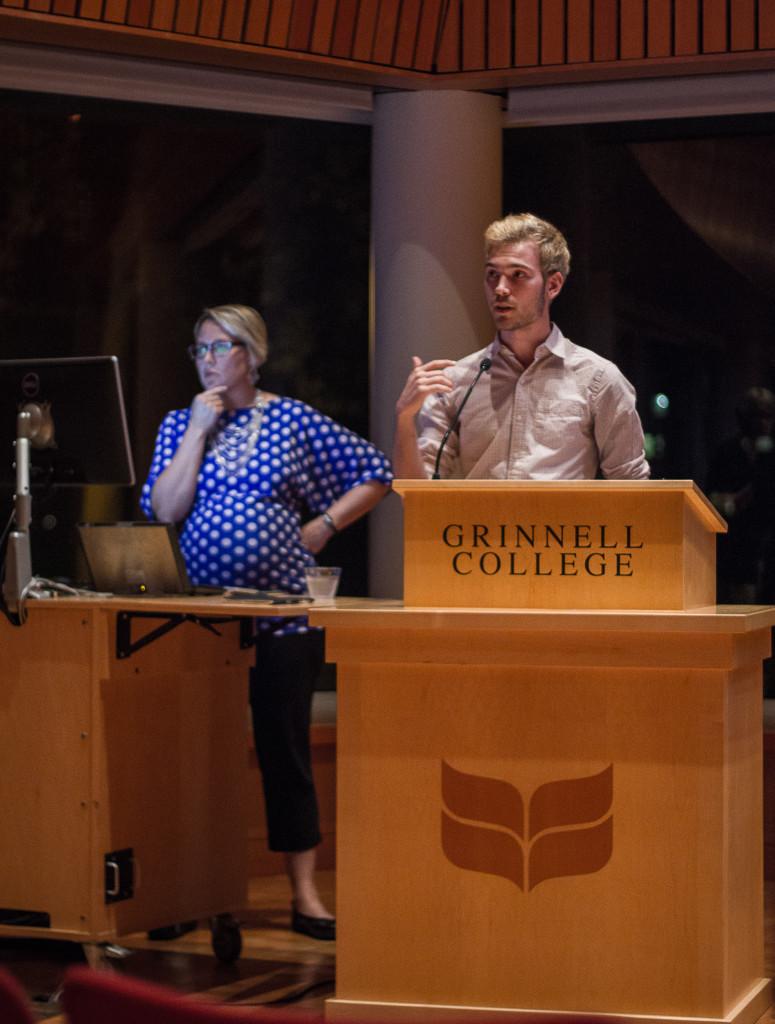
Teresa Fleming, News Editor
flemingt17@grinnell.edu
This semester students were introduced to a series of changes to Grinnell’s Title IX policy and procedure. The changes were outlined in an informational session last Monday, Sept. 28, which was followed by a question and answer period.
Dean of Students, Sarah Moschenross, explained during Monday’s session that sexual misconduct cases will now be investigated by the Kansas City-based firm, Husch Blackwell. Husch Blackwell will relay the results of their investigation to Marsha Ternus, a former chief justice of the Iowa Supreme Court, who will recommend an educational outcome to the College.
The College has also outlined a new set of timelines for the investigation and appeals processes. Investigations of sexual misconduct aim to be resolved within approximately 60 days of the initial report. Appeals processes are slated to take about 15 days. Both processes can be extended if new evidence is introduced to the case.
The changes to Grinnell’s adjudication and investigation procedures represent an attempt to establish a more impartial system for handling investigations of sexual misconduct.
“We wanted really experienced investigators who know how to investigate sexual assault, have lots of experience doing it, and we also wanted some distance, so that students could feel that and know that this was a third party that was impartially investigating and there’s no chance that the investigators know these people they’re investigating,” said Title IX Coordinator, Angela Voos. “We think that puts another layer of strength in the process.”
Voos also noted that students who have experienced sexual harassment or assault now have multiple options for how they can issue an initial statement. Students may issue a statement to Campus Safety and Security or to Deputy Title IX Coordinator for Case Management, Bailey Thompson. Students also have the option of issuing a statement to Husch Blackwell, either in person or via Skype.
Much of the discussion at last Monday’s event centered around the difficulties of complying with Title IX policy at a small college like Grinnell. SGA President Dan Davis ’16 noted that the size of Grinnell’s campus often makes policies like no-contact orders, which prohibit the involved parties from engaging in physical or verbal contact, difficult to enforce.
“At a college this size, it’s extremely hard to make sure that there is absolutely no contact between two students,” Davis said. “Whether it be walking past someone in Noyce or walking home at night to your dorm, the chances of running into any student is rather likely, and it’s hard to know where all students are at all times.”
Davis highlighted the difference between intentional and unintentional violations of no-contact orders, which can be issued while sexual misconduct investigations are ongoing and urged students to contact Campus Safety and Security if they think a no-contact order is being violated.
Voos cited the use of carve-outs as a method of limiting unintentional violations of no-contact orders. Carve-outs limit the times that students who have no-contact orders or who have been found responsible for sexual misconduct are allowed to access communal buildings, such as the Dining Hall.
Some students expressed concerns about the efficacy of no-contact orders. Devyn Shea ’17 is a leader of the student activist group Dissenting Voices, which advocates for Title IX policy reform. Shea questioned the College’s policy of not pre-determining minimum outcomes for students who are found responsible for specific forms of sexual misconduct.
“Grinnell College has no minimum outcomes delineated for rape. If you are found responsible for nonconsensual sexual intercourse, you can have any possible educational outcome applied in the world, and that can look like probation, and that can look like being expelled,” Shea said. “We’ve spoken already about [how] this is such a small campus and it’s so hard to avoid other students. Are we worried that by allowing the victim and the perpetrator to stay on the same campus that we might be putting people’s safety in jeopardy?”
Associate Vice President of Student Affairs Andrea Conner responded, explaining that while the College outlines a wide range of general outcomes for sexual misconduct, it does not delineate minimum outcomes for cases due to concern that such practices may discourage students from reporting sexual harassment and assault.
“We like to look at each case specifically and talk to both the complainant and the respondent to see what they would like to see happen and try to respond on a case by case basis that’s in a responsible manner to what the charges are, because no two cases are ever the same,” Conner said.
Conner also explained that a variety of factors can influence the outcome of a sexual misconduct case.
“I think the aggravating and mitigating factors make a lot of difference. For example, that may include things like … remorse, violence, context,” Conner said, “so these aggravating and mitigating factors are sort of an umbrella way to say why an adjudicator might look at two similar behaviors but there might be some slightly different outcomes.”
Over the past semester, administrators have responded to student feedback about the confusing nature of Title IX policy by introducing more simplified documents outlining the basic elements of a sexual misconduct investigation, which are slated to appear online soon. For now, Voos said, Monday’s discussion constitutes a step towards helping students understand how Title IX works at Grinnell.
“The big reason for having this [discussion] is so that people could see changes in the conduct process, and also to respond to what we heard last year, that students were confused,” Voos said. “We weren’t really being clear, and we needed to be clearer.”
If you have been sexually assaulted, harassed, or discriminated against the College has resources available.
Title IX Coordinator Angela Voos: 641-269-4999
Campus Safety and Security: 641-269-4600
CRSSJ: 641-269-4981
Grinnell Advocates: 641-260-1615

























































Denis Navratil • Oct 5, 2015 at 7:45 am
If a student accuses another of sexual misconduct, such as rape, why not call the police?